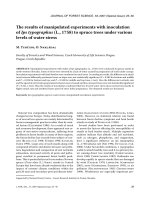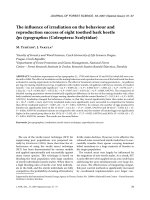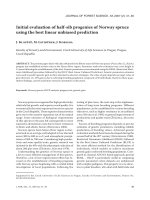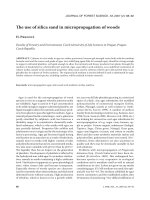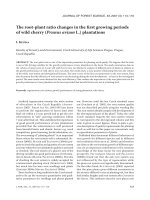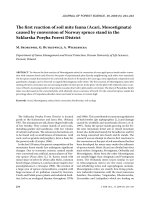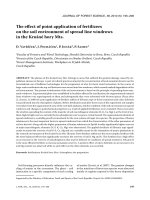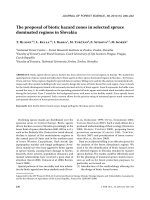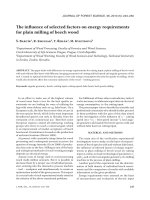Báo cáo lâm nghiệp: "The effect of liming on the mineral nutrition of the mountain Norway spruce (Picea abies L.) forest" docx
Bạn đang xem bản rút gọn của tài liệu. Xem và tải ngay bản đầy đủ của tài liệu tại đây (396.45 KB, 8 trang )
J. FOR. SCI., 55, 2009 (1): 1–8 1
JOURNAL OF FOREST SCIENCE, 55, 2009 (1): 1–8
Forests cover 33% of the Czech Republic’s area and
they have very important functions (natural habitat
for native plants and animals, landscape feature,
source of timber, influence on local climate, etc.).
But the fulfilment of these functions is limited by
the poor condition of Czech forests. Despite the air
pollution reduction during the 1990s, air pollution
is still one of the causes of this condition. e forests
in the border mountains (including the Moravian-Si-
lesian Beskids Mts.) and the forests in the highlands
are still exposed to acid deposition. Air pollution
caused the acidification of forest ecosystems. Acidi-
fication is induced by the transfer of pollutants from
the atmosphere to the ecosystem due to filtering
processes. Degradation of the health state of forests
and damage to forest soils were the results of the
long-term influence of air pollution (A
1999; A et al. 2000; K et al. 2001; N-
et al. 2003; P et al. 2004; K
2004; B et al. 2005). Extreme weather
(high air temperatures or precipitation deficit) is an-
other limiting factor influencing the development of
forests (B, W 2007; G et al. 2007;
Z et al. 2008) while adverse climatic conditions
increase the effect of air pollution impact. Synergic
effects of air pollution, atmospheric precipitation in
the growing season and mean annual air temperature
influence the health state of coniferous forests at 90%
(H 2004).
Liming was carried out most frequently in the
forest regions with the air pollution impact mainly
in the 1970s and 1980s. However, the observation
Supported by the Ministry of Education, Youth and Sports of the Czech Republic, Project No. MSM 6215648902.
e effect of liming on the mineral nutrition
of the mountain Norway spruce (Picea abies L.) forest
J. K, I. M, I. D, S. T
Faculty of Forestry and Wood Technology, Mendel University of Agriculture and Forestry in Brno,
Brno, Czech Republic
ABSTRACT: Mineral nutrition represents the uptake, transport, metabolism and utilization of nutrients by the for-
est stand. ese processes influence all physiological functions of trees. A specific minimum amount of all nutrients
is necessary for the healthy development and growth of forest trees. e uptake of nutrients is influenced not only
by natural conditions but also by anthropogenic activities. During the period of 2000–2005 the mineral nutrition
of mountain Norway spruce stands was studied at the study site Bílý Kříž (Moravian-Silesian Beskids Mts., Czech
Republic). Research was carried out in a spruce stand that was limed in the past years (in 1983, 1985 and 1987) and
in a spruce stand that was not limed in order to compare the liming effect on the mineral nutrition of spruce stands.
A positive liming effect was detected in the calcium, magnesium and phosphorus nutrition because their contents
in current needles were higher on the limed plots. No liming effect was determined in the nitrogen, potassium and
microelement (Fe, Mn, Cu, Zn, Al) content in current needles. Sufficient nutrition of spruce stands only with calcium
was recorded on all studied plots.
Keywords: macroelements and microelements content in needles; Norway spruce; liming; Moravian-Silesian Beskids
Mts.; Czech Republic
2 J. FOR. SCI., 55, 2009 (1): 1–8
of forest conditions after liming showed that liming
has both positive and negative effects on the forests.
us the long-term monitoring of forest conditions
after liming is required.
ere exist a lot of data on the liming effect on the
soil chemistry changes but data on the liming effect on
the mineral nutrition of forests are scarce. us, the
mineral nutrition of mountain Norway spruce stands
has been studied at the study site Bílý Kříž (Moravian-
Silesian Beskids Mts., Czech Republic) since 2000.
Research was carried out in a spruce stand which was
limed in the past years and in a spruce stand which
was not limed in order to compare the liming effect
on the mineral nutrition of spruce stands.
METHOD
Research on the mineral nutrition of limed and not
limed Norway spruce stands was conducted at the
study site Bílý Kříž (Moravian-Silesian Beskids Mts.,
Czech Republic). e coordinates of the study site
are 49°30'N and 18°32'E. Geological subsoil is com-
posed of the flysch layer with dominant sandstones.
e soil type is typical humo-ferric Podzol with the
mor-moder form of surface humus. e soils in the
studied spruce stands are medium deep to shallow,
loamy-sand and sandy-loam with a higher content
of the skeleton in the lower layers and with a rela-
tively low nutrient content. Soil depth is 60–80 cm.
Recently, surface humus has changed to the moder
type, of which a thin layer of Ol and Of soil horizons
is typical. e area is moderately cold, humid, with
abundance of precipitation. Mean annual air tem-
perature is 5.5°C, mean relative air humidity 80%
and mean annual sum of precipitation 1,100 mm
(K et al. 1989). Clean to almost clean
air is in this time at the study site Bílý Kříž according
to the survey of air quality in the region of the Czech
Republic (ČHMÚ 2001). e annual arithmetical
mean of sulphur dioxide was not higher than the
air pollution limit for forest stands (
(1), (2)
20 µg/m
3
)
during the studied period of 2000–2005. During the
growing season (May–October) the arithmetical
mean of SO
2
was in the interval of 3.0–4.9 µg/m
3
(mean value 4.0 g/m
3
, i.e. 20% of the limit). Except
for the growing season the arithmetical mean of
SO
2
was in the interval of 6.8–10.6 g/m
3
(mean
value 8.7 g/m
3
, i.e. 44% of the limit). e annual
arithmetical mean of nitrogen oxides was not higher
than the air pollution limit for forest stands (
(1), (2)
30 g/m
3
). During the growing season the arithme-
tical mean of NO
x
was in the interval of 4.5 to
6.5 g/m
3
(mean value 5.7 g/m
3
, i.e. 19% of the
limit). Except for the growing season the arithmetical
mean of NO
x
was in the interval of 8.0–11.2 g/m
3
(mean value 9.9 g/m
3
, i.e. 33% of the limit).
e limed Norway spruce stand was planted out
in 1981 using four-years-old seedlings of Picea
(1)
Air pollution limits for SO
2
and NO
x
for forest ecosystems according to EEC OSN and IUFRO for the vegetation protection
(Directive for the Air Quality in Europe. Ministry of the Environment of the Czech Republic, Praha 1996) (in Czech).
(2)
Act No. 86/2002 on Air Protection (Zákon č. 86/2002 Sb., o ochraně ovzduší).
Table 1. Characteristics of the Norway spruce stand on the limed plots FD and FS and on the not limed plot FK at the
study site Bílý Kříž
FD FS FK
Stand density
(trees/ha)
2000 2,600 2,100 2,600
2001 2,600 1,880*
2002 2,500** 1,820**
2003 2,440** 1,820
2004 2,048 1,652
2005 2,044 1,652 2,600
Mean stand height
(m)
2000 8.5 7.5
2001 9.0 8.3
2002 9.7 8.9 7.5
2003 10.4 9.6
2004 10.9 10.3
2005 12.2 11.2 11.0
*inning, **reduction of tress by the influence of meteorological conditions
J. FOR. SCI., 55, 2009 (1): 1–8 3
abies (L.) Karst. e mean slope of the plot is 13.5°,
its exposure is SSE and mean altitude 908 m a.s.l.
e age of trees was 28 years in 2005. e spruce
stand is divided into two partial plots with different
stand density (FD – dense stand, FS – sparse stand).
e area of each studied plot is 0.25 ha. Dolomitic
limestone (31% CaO, 21% MgO) was used for aerial
liming (3 tonnes per hectare at each events). Liming
was done in 1983, 1985 and 1987. e spruce stand
without liming was established by natural regenera-
tion of Picea abies (L.) Karst. e mean slope of the
plot is 30°, its exposure SE and mean altitude 850 m
a.s.l. e age of trees was 29 years in 2005. e area
of the studied not limed plot is 1.16 ha. Selected
characteristics of the spruce stands on limed and not
limed plots are shown in Table 1.
e evaluation of the mineral nutrition of spruce
stands was carried out on the basis of regular collec-
tions of needle samples and their chemical analysis.
Results of the analysis were compared with Table 2,
where optimum nutrition limits for macro- and mi-
croelements in Norway spruce according to H
(1986) and B (1993) are shown. Results
were compared with the results of Bergmann be-
cause this author also shows optimum limits for
microelements.
Samples of current needles were taken from eight
spruce trees selected on each studied plot during
the period from December to March in monthly
intervals. Samples were taken from the sunny crown
part from the fourth and the fifth whorl. Removed
needle samples were pre-desiccated, powdered and
Table 2. Optimum nutrition limits for macro- and microelements in Norway spruce
Macroelements (%)
N P K Ca Mg
B (1993) 1.35–1.70 0.25–0.30 0.50–1.20 0.35–0.80 0.10–0.25
H (1986) 1.30–1.50 0.12–0.15 0.45–0.60 0.08–0.10 0.20–0.30
Microelements (mg/kg)
Mn Cu Zn Fe
B (1993) 50–500 4–10 15–60 30–180
Table 3. A list of methods used for the analysis of needles removed on the limed plots (FD and FS) and on the plots
without liming (FK) at the study site Bílý Kříž in 2000–2005
C, N, S
high temperature oxidation in the dry way (C and N at the temperature of 1,000°C,
S at the temperature of 1,350°C) using a CNS-2000 LECO analyzer
Na, K atomic emissive spectrophotometry
Ca, Mg, Fe, Mn, Cu, Zn, Al flame atomic absorption spectrophotometry
P atomic absorption spectrophotometry
47
48
49
50
51
52
53
54
2000 2001 2002 2003 2004 2005
Carbon content in dry matter (%)
FD FS FK
Fig. 1. Carbon content in cur-
rent needles during dormancy
on the limed plots (FD and
FS) and on the not limed plot
(FK) at the study site Bílý Kříž
in 2000–2005 (I – confidence
interval, α = 0.05)
4 J. FOR. SCI., 55, 2009 (1): 1–8
dried at the temperature of 80°C. Carbon, nitrogen
and sulphur content was determined in all samples,
the content of phosphorus, calcium, magnesium,
potassium, iron, copper, manganese, zinc and alu-
minium was determined once a year in the samples
from December or March. Nutrients that were
determined in the needle samples and the used
method are shown in Table 3.
RESULTS AND DISCUSSION
Mineral nutrition represents the uptake, transport,
metabolism and utilization of nutrients by the forest
stand. ese processes influence all physiological
functions of trees. A specific minimum amount of all
nutrients is necessary for the healthy development
and growth of forest trees. e uptake of nutrients is
influenced not only by natural conditions but also by
anthropogenic activities (acid precipitation, timber
harvesting, reclamation, liming, fertilization and
so on) (D V et al. 1994; I 1995; T
1996; S et al. 1998; G et al.
2005). e knowledge of spruce stand nutrition is
important for the study of the production and health
state of stands and for the assessment of reclamation
measures in forest stands.
Carbon content in current needles during dor-
mancy fluctuated on all studied plots (limed and
not limed) during the period of 2000–2005 (Fig. 1).
No statistically significant differences in this content
were observed between limed and not limed plots
and between dense limed and sparse limed plots
(statistical differences were determined on the basis
of confidence intervals, α = 0.05). Nitrogen content
in current needles during dormancy fluctuated as
well (Fig. 2) but no statistically significant differ-
ences were found out between the studied plots.
us no effect of liming on the carbon and nitrogen
nutrition of the spruce stand was determined.
The content of calcium, magnesium and phos-
phorus in current needles during dormancy was
always higher on the limed plots than on the not
limed plot and statistically significant differences
were determined in their content (Figs. 3 to 5).
us a positive effect of liming on the calcium, mag-
nesium and phosphorus nutrition of the spruce stand
was determined. e same results were reported by
D V et al. (1994), I and H
(1999), I (1999), H et al. (2004,
2006), L (2006), R et al. (2006). No
statistically significant differences in the calcium,
Fig. 2. Nitrogen content in cur-
rent needles during dormancy on
the limed plots (FD and FS) and
on the not limed plot (FK) at the
study site Bílý Kříž in 2000–2005
(interval of sufficient nutrition
is marked grey, I – confidence
interval, α = 0.05)
Fig. 3. Calcium content in current
needles during dormancy on the
limed (FD and FS) and not limed
plot (FK) at the study site Bílý Kříž
in 2000–2005 (interval of sufficient
nutrition is marked grey, I – confi-
dence interval, α = 0.05)
0.00
0.20
0.40
0.60
0.80
1.00
1.20
1.40
1.60
1.80
2000 2001 2002 2003 2004 2005
Nitrogen content in dry matter (%)
FD FS FK
0.00
0.20
0.40
0.60
0.80
1.00
1.20
1.40
2000 2001 2002 2003 2004 2005
Calcium content in dry matter (%)
FD FS FK
J. FOR. SCI., 55, 2009 (1): 1–8 5
0.00
0.05
0.10
0.15
0.20
0.25
0.30
2000 2001 2002 2003 2004 2005
Magnesium content in dry matter (%)
FD FS FK
0.00
0.05
0.10
0.15
0.20
0.25
0.30
0.35
2000 2001 2002 2003 2004 2005
Phosphorus content in dry matter (%)
FD FS FK
Fig. 4. Magnesium content in
current needles during dor-
mancy on the limed plots (FD
and FS) and on the not limed
plot (FK) at the study site Bílý
Kříž in 2000–2005 (the interval
of sufficient nutrition is marked
grey, I – confidence interval,
α = 0.05)
Fig. 6. Potassium content in cur-
rent needles during dormancy on
the limed plots (FD and FS) and
on the not limed plot (FK) at the
study site Bílý Kříž in 2000–2005
(the interval of sufficient nutri-
tion is marked grey, I – confi-
dence interval, α = 0.05)
Fig. 5. Phosphorus content in
current needles during dor-
mancy on the limed plots (FD
and FS) and on the not limed
plot (FK) at the study site Bílý
Kříž in 2000–2005 (the interval
of sufficient nutrition is marked
grey, I – confidence interval,
α = 0.05)
magnesium and phosphorus content were found out
between the dense limed and sparse limed plots.
Potassium content in current needles during
dormancy fluctuated on all studied plots during
the period of 2000–2005 (Fig. 6) and no statistically
significant differences were detected among all stud-
ied plots. us no liming effect on the potassium
nutrition of spruce stand was determined. e same
results were reported by H et al. (2004).
Only calcium content in current needles during
dormancy was sufficient (see Table 2) on all studied
plots during the period of 2000–2005. Magnesium
content was sufficient only on the limed plots.
Nitrogen and phosphorus content was insufficient
and potassium content was mostly insufficient on
all studied plots.
Sulphur content in current needles during dor-
mancy (Fig. 7) fluctuated on all studied plots (limed
and not limed). But this content was mostly higher
on the not limed plot than on the limed ones even if
no statistically significant differences were observed.
It could be caused by the liming effect. Sulphur
0.00
0.20
0.40
0.60
0.80
1.00
1.20
1.40
2000 2001 2002 2003 2004 2005
Potassium content in dry matter (%)
FD FS FK
6 J. FOR. SCI., 55, 2009 (1): 1–8
content was higher than the values representing
a small increased sulphur content (
(3)
> 0.12% S in
dry matter) but was not higher than the values rep-
resenting a very high sulphur content (
(3)
> 0.30% S
in dry matter) on all the studied plots during the
whole studied period of 2000–2005. No statistically
significant differences were determined between the
dense limed and sparse limed plots.
Contents of microelements (Fe, Mn, Cu, Zn, Al)
in current needles during dormancy markedly fluc-
tuated on all studied plots (Table 4). eir contents
(except for copper) were sufficient. No statistically
significant differences were mostly found between
limed and not limed plots and between dense limed
and sparse limed plots. No liming effect on the
microelement content in the spruce stand needles
was determined. e same results were reported by
G et al. (2005).
CONCLUSION
Since the year 2000 the mineral nutrition of
mountain Norway spruce stands has been studied
at the study site Bílý Kříž (Moravian-Silesian Be-
(3)
e values of sulphur content are from M (1981).
0.00
0.05
0.10
0.15
0.20
0.25
0.30
0.35
0.40
2000 2001 2002 2003 2004 2005
Sulphur content in dry matter (%)
FD FS FK
Fig. 7. Sulphur content in current
needles during dormancy on the
limed plots (FD and FS) and on
the not limed plot (FK) at the study
site Bílý Kříž in 2000–2005 (the
interval of values representing a
small increase in sulphur content is
marked grey and representing very
high sulphur content is marked
lineation, I – confidence interval,
α = 0.05)
Table 4. Microelement contents in current needles during dormancy on the limed plots (FD and FS) and on the not
limed plot (FK) at the study site Bílý Kříž in 2000–2005
Fe (mg/kg) Mn (mg/kg) Zn (mg/kg) Cu (mg/kg) Al (mg/kg)
2000
FD 53.3 208.1 60.1 2.9 41.4
FS 111.9 189.4 50.7 2.8 48.9
FK 58.8 345.6 42.1 2.5 94.1
2001
FD 50.6 254.4 57.7 2.3 26.0
FS 55.8 233.0 47.7 2.4 32.9
FK 54.1 273.4 33.5 2.5 69.0
2002
FD 53.0 253.6 47.3 3.1 52.6
FS 53.5 280.3 53.5 2.9 51.4
FK 60.4 360.5 38.4 2.9 83.9
2003
FD 60.1 323.9 57.6 3.0 48.3
FS 53.3 269.8 56.0 2.7 53.9
FK 52.6 348.8 31.2 2.8 85.7
2004
FD 227.3 362.7 60.3 3.1 68.6
FS 218.3 353.2 61.9 2.6 58.7
FK 199.8 358.8 31.5 2.1 51.3
2005
FD 123.2 679.4 76.3 2.5 104.6
FS 84.9 562.1 77.9 2.7 84.3
FK 86.0 323.2 32.4 3.5 95.5
J. FOR. SCI., 55, 2009 (1): 1–8 7
skids Mts., Czech Republic). Research was carried
out in the spruce stand that was limed in the past
years and in the spruce stand that was not limed in
order to compare the liming effect on the mineral
nutrition of spruce stands. e aerial liming with
dolomitic limestone was carried out in 1983, 1985
and 1987. In this paper results determined during
the period of 2000–2005 are shown. A positive lim-
ing effect was detected in the calcium, magnesium
and phosphorus nutrition because their contents
in current needles were higher on the limed plots.
No liming effect was determined in the nitrogen,
potassium and microelement (Fe, Mn, Cu, Zn, Al)
content in current needles. Sufficient nutrition of
spruce stands only with calcium was recorded; the
content of other macroelements was below the
limits of sufficient nutrition. No differences in the
mineral nutrition between dense and sparse limed
plots were found out. us the stand density has no
effect on the mineral nutrition conditions.
R ef e re n c e s
AAMLID D., TØRSETH K., VENN K., STUANES A.O., SOL-
BERG S., HYLEN G., CHRISTOPHERSEN N., FRAMSTAD
E., 2000. Changes of forest health in Norwegian boreal
forests during 15 years. Forest Ecology and Management,
127: 103–118.
ANDERSON H.R., 1999. Health effects of air pollution epi-
sode. Air Pollution and Health: 461–482.
BERGMANN W., 1993. Ernährungsstörungen bei Kultur-
pflanzen. 3. Auflage. Jena, Gustav Fischer Verlag.
BODIN P., WIMAN B.L.B., 2007. e usefulness of stability
concepts in forest management when doping with increas-
ing climate uncertainties. Forest Ecology and Management,
242: 541–552.
BYTNEROWICZ A., BADEA O., POPESCU F., MUSSEL-
MAN R., TANASE M., BARBU I., FRACZEK W., GEM-
BASU N., SURDU A., DANESCU F., POSTELNICU D.,
CENUSA R., VASILE C., 2005. Air pollution, precipitation
chemistry and forest health in the Retezat Mountains,
Southern Carpathians, Romania. Environmental Pollution,
137: 546–567.
ČHMÚ (2001). Znečištění ovzduší na území České repub-
liky v roce 2000. Úsek ochrany ovzduší Praha. Praha,
ČHMÚ.
DE VISSER P.H.B., BEIER C., RASMUSSEN L., KREUTZER
K., STEINBERG N., BREDEMEIER M., BLANCK K., FAR-
RELL E.P., CUMMINS T., 1994. Biological response of five
forest ecosystems in the EXMAN project to input changes
of water, nutrients and atmospheric loads. Forest Ecology
and Management, 68: 15–29.
GRANIER A., REICHSTEIN M., BREDA N., JANSSENS I.A.,
FALGE E., CIAIS P., GRÜNWALD T., AUBINET M., BER-
BIGIER P., BERNHOFER C., BUCHMANN N., FACINI O.,
GRASSI G., HEINESCH B., ILVESNIEMI H., KERONEN P.,
KNOHL A., KÖSTNER B., LAGERGREN F., LINDROTH
A. et al., 2007. Evidence for soil water control on carbon and
water dynamics in European forests during the extremely
dry year: 2003. Agricultural and Forest Meteorology, 143:
123–145.
GRØNFLATEN L.K., AMUNDSEN L., FRANK J., STEINNES
E., 2005. Influence of liming and vitality fertilization on trace
element concentrations in Scots pine forest soil and plant.
Forest Ecology and Management, 213: 261–272.
HADAŠ P., 2004. Příčinná souvislost mezi klimatem, depozicí
S, N a H
+
a zdravotním stavem lesních porostů na území
ČR. Beskydy, 17: 9–16.
HUBER CH., KREUTZER K., RÖHLE H., ROTHE A., 2004. Re-
sponse of artificial acid irrigation, liming, and N-fertilisation
on elemental concentrations in needles, litter fluxes, volume
increment, and crown transparency of a N saturated Norway
spruce stand. Forest Ecology and Management, 200: 3–21.
HUBER CH., BAIER R., GÖTTLEIN A., WEIS W., 2006.
Changes in soil, seepage water and needle chemistry be-
tween 1984 and 2004 after liming and N-saturated Norway
spruce stand at the Höglwald, Germany. Forest Ecology and
Management, 233: 11–20.
HÜTTL R.F., 1986. Neuartige Waldschäden und Ährelement-
versorgung von Fichtenbeständen in Südwestdeutschland
am Beispiel Oberschwaben. Kali-Briefe, 17: 1–7.
INNES J.L., 1995. Influence of air pollution on the foliar nutri-
tion of conifers in Great Britain. Environmental Pollution,
88: 183–192.
IRGESLEV M., 1999. Above ground biomass and biomass
distribution in a limed and fertilized Norway spruce (Picea
abies) plantation. Part I. Nutrient concentrations. Forest
Ecology and Management, 119: 13–20.
IRGESLEV M., HALBÄCKEN L., 1999. Above ground biomass
and biomass distribution in a limed and fertilized Norway
spruce (Picea abies) plantation. Part II. Accumulation of
biomass and nutrients. Forest Ecology and Management,
119: 21–31.
KRATOCHVÍLOVÁ I., JANOUŠ D., MAREK M., BARTÁK
M., ŘÍHA L., 1989. Production activity of mountain culti-
vated Norway spruce stands under the impact of air pollu-
tion. I. General description of problems. Ekológia (CSSR),
8: 407–419.
KULHAVÝ J., 2004. Ecological Consequences of Conversion.
Chapter 6. In: SPIECKER H., HANSEN J., KLIMO E., Norway
Spruce Conversion – Options and Consequences. Leiden
– Boston – Koln, S. Brill Academic Publisher: 165–195.
KULHAVÝ J., BETUŠOVÁ M., FORMÁNEK P., 2001. A
contribution to the knowledge of resilience of forest ecosys-
tems at higher altitudes of the Moravian-Silesian Beskids.
Ekológia (Bratislava), 20: 15–35.
LOMSKÝ B., 2006. Minerální výživa smrku ztepilého (Picea
abies [L.] Karst.) v imisních oblastech. [Dizertační práce.]
Brno, MZLU, LDF: 180.
8 J. FOR. SCI., 55, 2009 (1): 1–8
MATERNA
J., 1981. Výživa smrkových porostů v Krušných
horách. Lesnictví, 27: 689–698.
NELLEMANN C., THOMSEN M.G., SÖDERBERG U.,
HANSEN K., 2003. Forest growth and critical air pollut-
ant loads in Scandinavia. Development in Environmental
Sciences, 3: 277–288.
PURDON M., CIENCIALA E., METELKA V., BERANOVÁ
J., HUNOVÁ I., ČERNÝ M., 2004. Regional variation in
forest health under long-term air pollution mitigated by
lithological conditions. Forest Ecology and Management,
195: 355–371.
ROSBERG I., FRANK J., STUANES A.O., 2006. Effects of
liming and fertilization on tre growth and nutrient cycling
in a Scots pine ecosystem in Norway. Forest Ecology and
Management, 237: 191–207.
STASZEWSKI T., IUKASIK W., GODZIK S., SZDZUJ J.,
UZIEBIO A.K., 1998. Climatic and air pollution gradient
studies on coniferous trees health status, needles wettability
and chemical characteristics. Chemosphere, 36: 901–905.
TICHÝ J., 1996. Impact of atmospheric deposition on the sta-
tus of planted Norway spruce stands: A comparative study
between sites in southern Sweden and the northeastern
Czech Republic. Environmental Pollution, 93: 303–312.
ZEPPEL M.J.B., MACINNIS-NG C.M.O., YUNUSA I.A.M.,
WHITLEY R.J., EAMUS D., 2008. Long term trends of stand
transpiration in a remnant forest during wet and dry years.
Journal of Hydrology, 349: 200–213.
Received for publication September 16, 2008
Accepted after corrections October 10, 2008
Corresponding author:
RNDr. I M, Mendelova zemědělská a lesnická univerzita v Brně, Lesnická a dřevařská fakulta,
Zemědělská 1, 613 00 Brno, Česká republika
tel.: + 420 545 134 189, fax: + 420 545 211 422, e-mail:
Vliv vápnění na minerální výživu horského smrkového porostu
ABSTRAKT: Minerální výživa představuje příjem, transport, metabolismus a využití živin lesním porostem. Tyto
procesy ovlivňují všechny fyziologické funkce stromů. Určité minimální množství živin je nutné pro zdravý rozvoj
a růst lesních dřevin. Příjem živin je ovlivňován nejen přírodními podmínkami, ale také antropogenními aktivita
-
mi. V období let 2000–2005 byla sledována minerální výživa porostů smrku ztepilého na výzkumné ploše Bílý Kříž
(Moravskoslezské Beskydy). Výzkum byl prováděn jednak ve smrkovém porostu, který byl v minulosti vápněn (v letech
1983, 1985 a 1987), jednak ve smrkovém porostu, který vápněn nebyl, aby bylo možné srovnat účinky vápnění na
minerální výživu smrkových porostů. Byl zjištěn pozitivní účinek vápnění na výživu vápníkem, hořčíkem a fosforem,
neboť na vápněných plochách byl jejich obsah v prvním ročníku jehličí vyšší než na nevápněné ploše. Nebyl zjištěn
vliv vápnění na obsah dusíku, draslíku a mikroelementů (Fe, Mn, Cu, Zn, Al) v prvním ročníku jehličí. Na všech
studovaných plochách byla zjištěna dostatečná výživa smrkových porostů pouze vápníkem.
Klíčová slova: obsah makroelementů a mikroelementů v jehličí; smrk ztepilý; vápnění; Moravskoslezské Beskydy;
Česká republika
